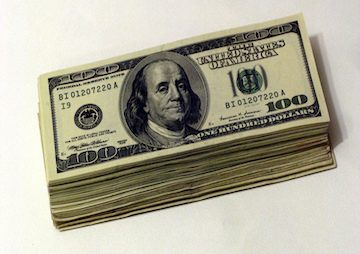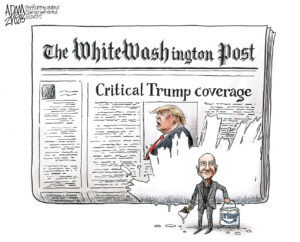Gimme Shelter (From the Tax Man): Disappearing Money and Opportunistic Candidates
While the two leading candidates for the presidency, Donald Trump and Hillary Clinton, have indeed suggested cosmetic fixes for a situation that only grows more extreme with the passage of time, they have themselves taken advantage of numerous tax “efficiency” strategies that make money evaporate. Miran Rijavec / CC-BY-2.0)
1
2
3
4
Miran Rijavec / CC-BY-2.0)
1
2
3
4
Under the tax plan he’s touting in his presidential campaign, U.S. businesses would see a reduction in their maximum tax rate from 35% to 15%. This lower rate (“one of the best in the world”) would, he claims, render corporate inversions unnecessary. The Donald apparently hopes that corporate America will be so eternally grateful to him that they’ll move their money back onshore and pay taxes on it voluntarily (though most of them already don’t pay the top tax rate here anyway).
Trump’s views on a “repatriation tax holiday” that would let companies bring home their overseas stashes on a one-time basis for little or nothing have shifted over the course of his candidacy. Last year, he proposed the repatriation of hidden funds without penalty or taxation of any kind. Now he’s advocating a more populist one-time 10% tax on them.
Although a key promise of his tax reform plan is to end the practice of stockpiling money in offshore accounts by American companies, he has personally invested in many of the companies that do so. As CBS News noted, in October 2015, Trump owned stock in 22 of the top 30 Fortune 500 companies ranked by their number of offshore subsidiaries. It’s a group that has engineered 1,225 tax-haven subsidiaries holding $1.4 trillion. Of course, Trump has a keen understanding of the practices that disguise or shelter money from taxes. As he explained to supporters in Iowa this January, when it comes to his own business enterprises, “I pay as little as possible. I use every single thing in the book.”
Bernie
As far as we know, Bernie has no personal experience with tax havens and has a far more structured plan than either of the leading candidates to combat their money-sucking, tax-dodging prowess. His policies would prevent American companies from avoiding U.S. taxes through inversions, block them from escaping taxes by establishing a post office box in a tax haven site, and end the practice of letting corporations defer paying taxes on profits from offshore subsidiaries.
In the real world, financial speculation, crime, and tax evasion — sorry for this word again — trump the highly touted goal of “free trade” when it comes to tax havens. Bernie understood this well when he voted against the Panama “free trade” agreement of 2011. In a Senate speech on the subject, he presciently noted that “Panama is a world leader when it comes to allowing large corporations and wealthy Americans to evade U.S. taxes by stashing their cash in offshore tax havens. And the Panama free trade agreement would make this bad situation much worse.”
He was right then and he remains right today. Unfortunately, no one was listening or interested in acting on his warning — certainly not Hillary, who, as secretary of state, characterized the agreement as “an example of the Obama Administration’s commitment to economic statecraft and deepening our economic engagement throughout the world.”
In practical terms, Sanders went significantly further than Hillary by formulating actual legislation on the subject. Last April, he introduced the Corporate Tax Dodging Prevention Act of 2015 in the Senate. Among other things, it aspires to “prevent corporations from sheltering profits in tax havens like Bermuda and the Cayman Islands and would stop rewarding companies that ship jobs and factories overseas with tax breaks.”
Regarding inversions, he would treat companies as American for tax purposes if they were majority-owned by U.S. interests and operating in this country. Even his plan, however, would fall short unless it made inversions illegal — and too many companies are invested in not letting that happen.
Ted
Ted would abolish the Internal Revenue Service and enable people and companies to file taxes on a postcard, so there’s no real point in further analysis of his “positions” on tax havens.
Missing Money Costs
As of 2014, according to Gabriel Zucman, University of California economist and author of The Hidden Wealth of Nations, at least $7.6 trillion, or approximately 8% of global financial wealth, was “missing” somewhere offshore. His analysis demonstrates that the sorts of tax-dodging practices we’ve been discussing put governments across the planet in the red by approximately $200 billion annually. Tax avoidance by major U.S. companies costs governments an additional $130 billion per year since nearly a third of their profits are hidden offshore.
The U.N. estimates that tax dodging by multinational companies costs developing countries $100 billion a year, an amount “equivalent to what it would cost to provide basic life-saving health services or safe water and sanitation to more than 2.2 billion people.”
There are, in other words, harrowing costs to tax dodging. When the wealthy and powerful hide money from governments or speculate with it in sneaky ways, it destabilizes economies and enables the commission of crimes that place a further burden on ordinary people. When money flows from the economic necessities needed by the less privileged to the top fraction of a percent of the world’s population and is then hidden offshore, essentially “disappeared,” it’s a net drain on and a blow to the world economy. This impacts jobs and the quality of our future. Unfortunately, the leading candidates in this election year aren’t championing a major change for the better.
Nomi Prins, a TomDispatch regular, is the author of six books, a speaker, and a distinguished senior fellow at the non-partisan public policy institute Demos. Her most recent book is All the Presidents’ Bankers: The Hidden Alliances That Drive American Power (Nation Books). She is a former Wall Street executive. Special thanks go to researcher Craig Wilson for his superb work on this piece.
Follow TomDispatch on Twitter and join us on Facebook. Check out the newest Dispatch Book, Nick Turse’s Tomorrow’s Battlefield: U.S. Proxy Wars and Secret Ops in Africa, and Tom Engelhardt’s latest book, Shadow Government: Surveillance, Secret Wars, and a Global Security State in a Single-Superpower World.
Copyright 2016 Nomi Prins Dig, Root, GrowThis year, we’re all on shaky ground, and the need for independent journalism has never been greater. A new administration is openly attacking free press — and the stakes couldn’t be higher.
Your support is more than a donation. It helps us dig deeper into hidden truths, root out corruption and misinformation, and grow an informed, resilient community.
Independent journalism like Truthdig doesn't just report the news — it helps cultivate a better future.
Your tax-deductible gift powers fearless reporting and uncompromising analysis. Together, we can protect democracy and expose the stories that must be told.
This spring, stand with our journalists.
Dig. Root. Grow. Cultivate a better future.
Donate today.








You need to be a supporter to comment.
There are currently no responses to this article.
Be the first to respond.